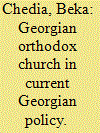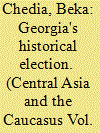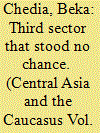| Srl | Item |
| 1 |
ID:
088535


|
|
|
|
|
| Publication |
2009.
|
| Summary/Abstract |
For a long time now elections in Georgia have been a source of political crises rather than a mechanism of democratic power change. In recent Georgian history, in fact during the entire period of its independence, the government in power has never been changed through elections. The only exception so far were the very first multiparty parliamentary elections of 28 October, 1990 when the national political force, The Round Table-Free Georgia, headed by Zviad Gamsakhurdia replaced the ruling Communist Party. Later President Gamsakhurdia was overthrown. For some time after the regime change the ruling party led by Eduard Shevardnadze won all the successive elections until he, in turn, was removed from power by the revolution of 2003
|
|
|
|
|
|
|
|
|
|
|
|
|
|
|
|
| 2 |
ID:
096049


|
|
|
| 3 |
ID:
094368


|
|
|
| 4 |
ID:
118754


|
|
|
|
|
| Publication |
2012.
|
| Summary/Abstract |
On 1 October, 2012, the Georgian people made an important historical choice in favor of the Georgian Dream political opposition coalition headed by billionaire Bidzina Ivanishvili. This event will undoubtedly go down in the country's annals as the first time the opposition was brought to power not by revolution, but by election. And despite a certain opinion prevailing in society that a revolution might be possible, political tradition in post-Soviet Georgia took an extremely unexpected turn.
The thing is that elections of any scope in Georgia have long failed to be a mechanism for bringing about a democratic change in power, acting instead as a pretext for carrying out coups or revolutions. Since the Soviet Union collapsed and Georgia acquired its independence, essentially no power change in the country has occurred by means of an election.
|
|
|
|
|
|
|
|
|
|
|
|
|
|
|
|
| 5 |
ID:
118788


|
|
|
| 6 |
ID:
135097


|
|
|
|
|
| Summary/Abstract |
The author analyzes the specifics of political leadership in Georgia and what people think about them, as well as the new trends that came to the fore after the 2013 presidential election, the leadership’s resources, and the ways the political community “recruits” new members.
The author compares the prominent features of the presidencies between 1991 and 2014 to explain the subtleties of political leadership in Georgia.
He also tries to examine why the Constitution is regularly amended to redistribute legal powers between the president and prime minister.
|
|
|
|
|
|
|
|
|
|
|
|
|
|
|
|
| 7 |
ID:
127606


|
|
|
|
|
| Publication |
2013.
|
| Summary/Abstract |
The author analyzes the prerequisites and specifics of the development of civil society in Georgia, as well as the contradictions between society and the state and between society and NGOs. He looks at how the attitude of the people in power toward the electorate changes after elections, as well as at the population's feelings about the state and political elites. He also identifies the factors that interfere with the development of real civil society in Georgia and the methods used to shape public opinion.
He focuses particular attention on the "intelligentsia" as a social phenomenon and describes in detail its involvement in political life and in shaping civil society and public opinion.
|
|
|
|
|
|
|
|
|
|
|
|
|
|
|
|